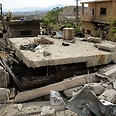
Strategic value of shock and shush raids
Analysis: Israeli airstrikes expose inherent weakness of its enemies, emptiness of their threats
During the last couple of weeks, the concept of “shock and shush” has been widely discussed. The Israeli strategy of conducting surgical strikes against top tier targets is not a new one, but it has gained an incredible amount of attention due to the alleged targeting of military objectives inside Syria.
Since 1967 and most importantly since the elimination of the Iraqi nuclear threat, the Israeli Air Force has played a central role in the defense of the Jewish State by enhancing its power projection capabilities.
It is clear to anyone that since 1948, Israel has been living in a tough neighborhood where bigger and numerically far superior states and organizations have been merging forces in order to attack and harm the Jewish state. With greater national cohesion, technically superior weaponry and well-crafted tactics Israel has been able to rebuke its enemies each time they attempted to endanger its existence. One of the essential traits of the strategy used in almost all major engagements has been the element of surprise and the flexibility of the Israeli ground and air forces with the common objective of seizing the initiative and depriving the enemy of its capacity to dictate the course and the tempo of its actions.
The current strategy of strikes against key military assets of the Syrian regime is once again successful in depriving the enemies of Israel of the ability to coordinate any offensive action that may harm the Jewish state.
By conducting raids when it deems necessary to, the Jewish State issues a clear warning based on two points. On the one hand, it is made clear that the military superiority of the Israeli Defense Forces is close to absolute. The ability to control the air and to gather necessary information sets Israel above any of its regional adversaries.
Control public discourse
On the other hand, Israel exposes the inherent weakness and emptiness of its enemies’ threats. Regardless of the arrogance any of the regional regime shows in its taunts against the Jewish state, their inability to defend themselves and to respond in a conventional, state-led fashion represents their military inferiority and the shallowness of their propaganda.
It also, and maybe this represents the true added value of such raids, creates a sentiment of constant vulnerability in the hearts of the Syrian military planners, a message which does not remain unread by the cadre of Hezbollah nor by the Iranian regime.
The secrecy of these operations, their effectiveness and the overall inability to retaliate against them creates a situation in which Israel’s enemies are left drowsy while their tactical and strategic plans are constantly altered and their assets diminished.
These attacks are also successful in frustrating leaders and organizations which for the last decades have been boasting their anti-Israeli initiatives. While Arab states along with Iran and regional terrorist organizations have stepped up their rhetoric against the Jewish State, their effective ability to surprise Israel in a strategic attack has diminished.
This does not mean that Israeli citizens are no longer under the threat of terrorism and random rocket fire. In fact, the opposite is true.
Since, conventional and semi-conventional techniques are bound to fail, the enemies of Israel are increasingly feeling like they are pushed in the ropes. At these moments, like in a boxing game, the inferior fighter is likely to use low blows or illegal techniques to delay as much as possible the fatidic moment where his situation will be irreversible. In fact, if a coordinated response to these “shock and shush” raids may not happen, Syria and Iran are likely to step up their support for paramilitary and non-state organization.
Surprise raids and single strikes should nevertheless be considered a double edged sword for Israel. As it had been the case in the early days of the Israeli intervention in Lebanon in 2006, the Israeli ability to target enemy infrastructure pushes the latter to increasingly dissimulate its materiel and adopt non-conventional tactics putting at risk the life of civilians. In this sense, Israel may fall victim to its own success. In fact, the ability to target high value objectives does not in itself eliminate the threat posed by terrorist organizations and enemy states. The deterrence created by those strikes should not be overplayed as they do not inflict irreversible damage to the enemy, leaving its will to harm Israel almost intact. In other words they are useful to contain, not defeat, an enemy.
Since Israel’s independence, the Israeli Defense Forces have exploited the element of surprise and the rapidity of small unit /commando style actions act as a force multiplier. As the Egyptians, Syrians and Jordanians learnt in 1967, Assad and Hezbollah are currently experiencing Israel’s ability to strike any target it deems a strategic one. This is the reason why the Hamas leadership remains bunkered under a civilian hospital or why Hezbollah maintains its weapons hidden in villages.
For this situation to be possible, Israel needs to keep and develop two key assets: Its ability to collect and assess vital intelligence regarding its neighbors’ activities and a command and control structure which enables swift, rational and democratic decision making.
In addition to that, the governmental institutions need to outline a clear strategy to control the public discourse. In the era of mass communication, this last point is essential, as if it is badly handled it can deprive Israel of a part of its strategic advantage.
Riccardo Dugulin holds a Master degree from the Paris School of International Affairs (Sciences Po) and is specialized in International Security. He is currently working in Paris for a medical and security assistance company. He has worked for a number of leading think tanks in Washington DC, Dubai and Beirut. Personal website: www.riccardodugulin.com










